
Nordisk Judaistik-Scandinavian Jewish Studies
Scope & Guideline
Bridging Cultures: Unveiling Jewish Identity in Scandinavia
Introduction
Aims and Scopes
- Antisemitism Studies:
A significant focus on the history and manifestations of antisemitism in Scandinavian countries, exploring its roots, development, and impact on Jewish communities. - Jewish History in Scandinavia:
Research dedicated to the historical experiences of Jews in Nordic countries, including migration, community formation, and the socio-economic aspects of Jewish life. - Cultural Contributions:
Examinations of Jewish contributions to the arts, literature, and cultural practices in Scandinavia, highlighting the interplay between Jewish and non-Jewish cultures. - Identity and Memory:
Studies on Jewish identity, memory culture, and the evolving nature of Jewish practices in contemporary Scandinavian societies. - Interdisciplinary Approaches:
Utilization of various methodologies, including historical analysis, ethnography, and literary critique, to enrich the understanding of Jewish life and thought in the Scandinavian context.
Trending and Emerging
- Conspiracist Antisemitism:
A notable increase in papers addressing conspiracist antisemitism, particularly in the context of historical and contemporary narratives in Nordic countries, highlighting its resurgence and relevance in modern discourse. - Jewish Identity in Modern Contexts:
Growing focus on the complexities of Jewish identity in contemporary Scandinavian societies, reflecting on issues like intermarriage, conversion, and the dual identities of Jewish individuals. - Cultural and Artistic Expression:
Emerging interest in the role of Jewish cultural expressions, particularly in literature and the arts, as a means of understanding Jewish life and resilience in Scandinavian contexts. - Refugee Experiences and Historical Memory:
Increasing attention to the experiences of Jewish refugees in Scandinavia, particularly during and after the Holocaust, and how these narratives shape current understanding of Jewish history and memory.
Declining or Waning
- General Jewish History:
The broad narratives of Jewish history outside the Scandinavian context have become less prominent, with a shift towards more localized and specific studies that focus on particular events or communities. - Traditional Jewish Practices:
Themes centered on traditional Jewish religious practices and rituals appear to have diminished, possibly as the journal emphasizes contemporary identity and cultural issues. - Historical Figures:
Less frequent exploration of historical figures in Jewish history, indicating a move away from biographical studies to more thematic or collective analyses.
Similar Journals

Images
Decoding the Impact of Visuality on Cultural NarrativesImages, published by BRILL, serves as a significant academic platform within the realms of Cultural Studies, History, Religious Studies, and the Visual Arts and Performing Arts. With its ISSN 1871-7993 and E-ISSN 1871-8000, this journal is committed to providing a scholarly forum that engages with the complexities of visual representations and their impact on cultural narratives. Though it currently holds a Q4 category ranking across various fields, indicating room for growth, its presence in Scopus rankings showcases its contribution to the arts and humanities, positioning it as a unique voice in interdisciplinary discourse. The journal aims to publish innovative research that fosters dialogue among scholars, practitioners, and students interested in the intersections of visual culture and societal dynamics. Despite its non-open access status, Images remains a vital resource for those seeking to understand the intricate fabric of cultural expressions from historical and contemporary perspectives, offering insights that resonate across academic and artistic landscapes.

Judaica Bohemiae
Documenting the Evolving Dynamics of Jewish LifeJudaica Bohemiae, published by the Zidovske Muzeum Praze, is a prominent scholarly journal dedicated to the study of Jewish culture, history, and religious practices, with a particular focus on the Czech Republic and Central Europe. Since its relaunch in 2007, the journal has established itself as a valuable resource in the fields of Cultural Studies, History, and Religious Studies, achieving a commendable Q2 ranking across these disciplines in 2023. With its thoughtful compilation of research articles and critical essays, Judaica Bohemiae offers insights into the evolving dynamics of Jewish existence and identity. Although it does not currently operate under an open access model, the journal ensures that its high-quality content remains accessible to researchers, professionals, and students interested in the nuanced intersections of culture and history. By promoting rigorous academic discourse and advancing the understanding of Jewish heritage, Judaica Bohemiae continues to play a crucial role in its field, fostering scholarly connections and illuminating the past for future generations.
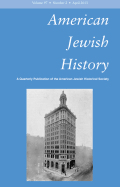
AMERICAN JEWISH HISTORY
Exploring the Tapestry of Jewish Life in AmericaAMERICAN JEWISH HISTORY is a premier academic journal published by Johns Hopkins University Press, dedicated to the exploration and analysis of the Jewish experience in the American context. With ISSN 0164-0178 and E-ISSN 1086-3141, this journal serves as a vital resource for scholars and students in the fields of cultural studies, history, and religious studies, as evidenced by its placement in the Q3 quartile across these disciplines in 2023. Reaching a broad audience interested in the historical, social, and cultural dimensions of the American Jewish narrative, the journal has converged in various years, ensuring a robust collection of multidisciplinary research and discussions. Although it operates under a traditional subscription model, the journal remains an essential platform for critical analysis, fostering deeper understanding of Jewish identity and history. With Scopus rankings placing it at the 60th percentile in History and 62nd percentile in Religious Studies, AMERICAN JEWISH HISTORY stands as a respected publication that significantly contributes to the discourse surrounding Jewish history and culture in the United States.
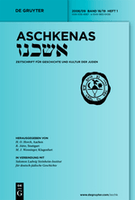
Aschkenas-Zeitschrift fuer Geschichte und Kultur der Juden
Advancing Knowledge in Jewish StudiesAschkenas-Zeitschrift fuer Geschichte und Kultur der Juden, published by WALTER DE GRUYTER GMBH, is a distinguished academic journal that delves into the rich history and cultural heritage of Jewish communities. Based in Germany, this journal is indexed under the ISSN 1016-4987 and E-ISSN 1865-9438, making its contributions accessible to an international audience. Although it currently operates without open access options, the journal serves as an important platform for researchers in the fields of Arts and Humanities, History, Literature and Literary Theory, and Religious Studies, as evidenced by its publication history from 1996 to 2023. While ranked in the fourth quartile across various categories on Scopus, the journal provides critical insights and interdisciplinary approaches that enrich the understanding of Jewish cultural narratives. Researchers, professionals, and students alike will find valuable content that not only highlights historical perspectives but also engages with contemporary cultural discussions. This journal remains a vital resource for those seeking to deepen their knowledge and contribute to ongoing dialogues in Jewish studies.
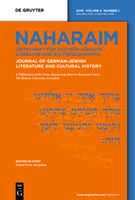
Naharaim
Bridging Cultures through Rigorous Academic InquiryNaharaim is a distinguished academic journal dedicated to fostering interdisciplinary scholarship in the field of Near Eastern studies. Published by Walter de Gruyter GmbH, this journal aims to provide a platform for innovative research that explores the rich historical, cultural, and social dynamics of the region. With an ISSN of 1862-9148 and an E-ISSN of 1862-9156, Naharaim adheres to high academic standards, although it does not currently offer open access options. The journal aspires to engage a global audience of researchers, professionals, and students eager to contribute to and gain insights from the evolving discourse surrounding Near Eastern cultures and histories. Through rigorous peer-reviewed articles, Naharaim plays a vital role in advancing knowledge and understanding in a field of study that is increasingly relevant in today’s interconnected world.

Quest-Issues in Contemporary Jewish History
Unveiling Insights into Contemporary Jewish NarrativesQuest - Issues in Contemporary Jewish History is a pivotal open-access journal published by the Fondazione Centro Documentazione Ebraica Contemporanea in Italy. Since its inception in 2010, this journal has been dedicated to the scholarly exploration of the multifaceted dimensions of contemporary Jewish history, making significant contributions to the fields of history and cultural studies. With an ISSN of 2037-741X, it serves as a vital platform for researchers, professionals, and students alike, providing access to an array of insightful articles and research findings. As of 2023, it holds a respectable Q3 ranking in the History category within Scopus, indicating its growing influence in academia, alongside a rank of #899 out of 1760 in Arts and Humanities – History. This makes it an essential resource for those looking to deepen their understanding of Jewish history in a contemporary context. The journal, with its rich scholarly outputs converging from 2017 to 2023, is based in Milan and strives to foster high-quality research in Jewish studies.
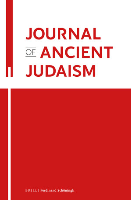
Journal of Ancient Judaism
Illuminating the Cultural Contexts of Ancient JudaismThe Journal of Ancient Judaism is an esteemed academic publication focusing on the dynamic field of religious studies, particularly the historical and cultural contexts of ancient Judaism. Published by BRILL, a reputable international publisher known for its scholarly contributions, this journal is dedicated to advancing the study of ancient Jewish texts, traditions, and their socio-political environments. With an ISSN of 1869-3296 and an E-ISSN of 2196-7954, the journal has established its footprint in the scholarly community, supported by its ranking in the Q3 quartile for Religious Studies in 2023 and a Scopus rank of #371 out of 644 in its category. The content showcased in this journal is vital for researchers, professionals, and students alike, offering peer-reviewed articles that contribute to the broader understanding and appreciation of ancient Jewish heritage and its influence on contemporary religious thought. With a timeline spanning from 2015 to 2024, the journal aims to facilitate rigorous academic discourse and provide open access to vital research findings, fostering a deeper engagement with the complexities of ancient Judaism.

European Journal of Jewish Studies
Fostering Critical Inquiry into Jewish History and LiteratureEuropean Journal of Jewish Studies is a distinguished academic publication that offers a comprehensive platform for scholarly inquiry into Jewish studies, addressing critical intersections with cultural studies, history, literature, and religious studies. Published by BRILL, a leading academic publisher based in the Netherlands, this journal boasts a robust reputation supported by its impressive rankings and quartile classifications—Q3 in Cultural Studies, Q3 in History, Q2 in Literature and Literary Theory, and Q3 in Religious Studies as of 2023. With its convergence years spanning from 2007 to 2024, the journal serves as a vital repository of research that navigates the complexities of Jewish identity and culture through interdisciplinary lenses. Although it does not operate under an open access model, the journal's rigorous peer-review process ensures the publication of high-quality research essential for students, professionals, and academics alike. Engaging with this journal opens up pathways for critical dialogue and innovative contributions to the field, making it an essential resource for those invested in the rich tapestry of Jewish studies.

Jewish Historical Studies-Transactions of the Jewish Historical Society of England
Pioneering Research on Jewish Historical ContextsJewish Historical Studies - Transactions of the Jewish Historical Society of England is a premier scholarly journal dedicated to advancing the understanding of Jewish history in its diverse contexts. Published by UCL PRESS, this open access journal has been freely accessible since 2015, providing an invaluable resource for researchers, educators, and students alike. With an ISSN of 0962-9696 and E-ISSN 2397-1290, it features a wide variety of articles that delve into topics related to the historical, cultural, and societal aspects of Jewish communities. Located at University College London, the journal is committed to fostering interdisciplinary insights and encouraging critical discourse within Jewish studies. Its dedication to open access amplifies the visibility and dissemination of high-quality research, ensuring that vital scholarship reaches a global audience. As a vital platform for sharing cutting-edge research, Jewish Historical Studies plays a crucial role in the ongoing dialogue regarding Jewish history, heritage, and identity.
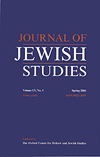
JOURNAL OF JEWISH STUDIES
Fostering Dialogue on Jewish Identity and LegacyJOURNAL OF JEWISH STUDIES, published by the Oxford Centre for Hebrew and Jewish Studies, stands as a distinguished platform for scholarly discourse in the fields of Jewish history, culture, literature, and religious studies. With its ISSN 0022-2097, this journal is recognized for its significant contributions to understanding Jewish heritage and thought, achieving commendable rankings in various categories, including Q1 in Literature and Literary Theory and Q2 in History and Cultural Studies, as of 2023. The journal fosters rigorous academic engagement and encourages researchers and scholars worldwide to explore the complexities of Jewish identity and its interconnections with broader historical narratives. Operating without an open access model, it nonetheless ensures a wide reach through its well-regarded reputation, making it an essential resource for anyone invested in Jewish studies. With a publication history spanning from 2002 to 2024, the journal continues to serve as an invaluable repository of knowledge and insight for students, researchers, and professionals alike.